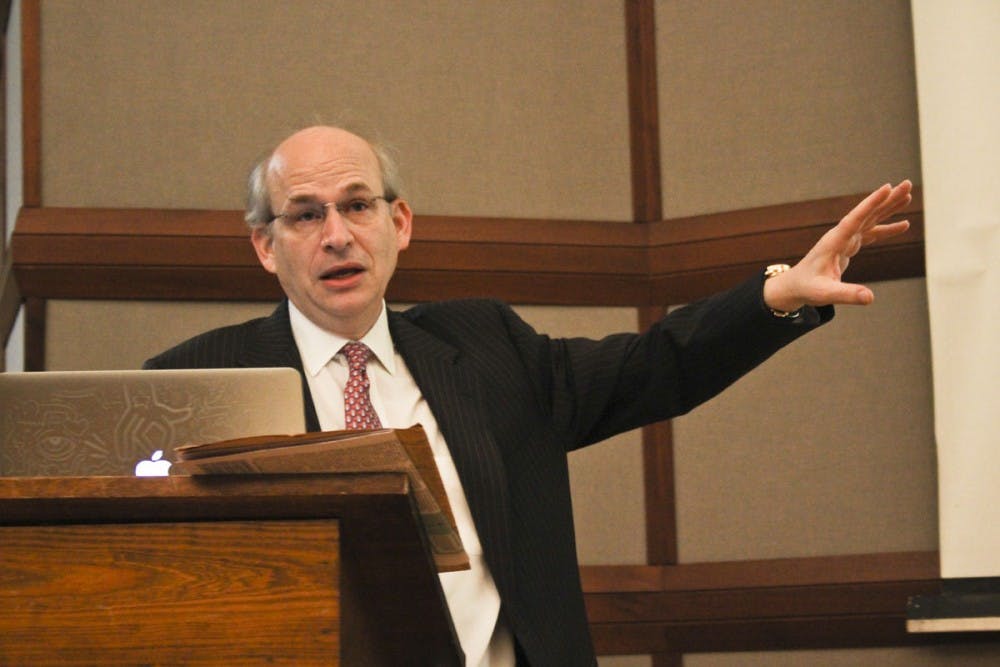Leebron visits Senate, addresses state of university

President Leebron at Senate
President David Leebron presented on the state of the university at the Student Association Senate meeting Wednesday, discussing topics from long-term initiatives to changes in student makeup and priority, followed by a question and answer session.
Leebron began his speech with an analysis of the mission statement and Edgar Odell Lovett’s vision of Rice as a place of both learning and teaching.
“One of my favorite developments at Rice was the student-taught courses or college courses,” Leebron said. “I can’t think of many things that represent the philosophy of this university much more than that.”
Leebron introduced his key ideas in education, including: logical evolution/revolution, changing value proposition, access and affordability, financial sustainability/research funding, sexual assault and campus climate, athletics model and rankings. Leebron continued on to describe the efforts of the students and administration on the sexual assault policy.
“I think this has been a good area in which students and administration have worked together,” Leebron said. “It’s something we all have to take seriously and we all have to bring a Rice philosophy to it, which is this culture of care.”
Leebron addressed Rice’s recent drop in Princeton Review’s quality of life and happiness rankings and said the control that students feel over their environment contributes to Rice historical performance in rankings.
“We pay attention to [U.S. News and World Report rankings] and think about what we can do, but no we’re not going to do those things that violate our fundamental commitment, and that includes commitment to access to our education,” Leebron said.
A few of the areas being considered after this year’s ranking release include the graduation rate, class sizes, and how well known Rice is.
“The way U.S. News works, it makes a big difference between whether the graduation rate is 91 percent or 93 percent,” Leebron said. “That’s a big thing, and we ought to be better at that than everybody else. And we’re pretty good. We’re around a 90 percent graduation rate in six years.”
Leebron said he had numerous priorities for the new century: strategic academic priorities, school investments, campus infrastructure investments, and administrative effectiveness and efficiency. School investment includes investing in overburdened departments such as psychology and economics.
“When I went to school, people would say what we were paying for is what happens in the classroom and the grading of exams, a major, transcript, and degree, and that’s 75 percent of what I’m paying for,” Leebron said. “That 75 percent has been reduced in my mind to something like 25 percent.”
Leebron said he stressed research and student leadership as integral parts of the Rice experience that should be given a formal and educational framework. New certificates are being created to reflect students’ efforts in a historical record after they have graduated.
Since fall 2003, the student body has gone from 55 percent caucasian to 43 percent caucasian and Asian-American students comprise 26 percent of the student body, up from 15 percent. The international student population represents 12 percent of the student body; it represented 3 percent of the student body in 2003.
“The most dramatic is the change in the diversity of the undergraduate student body,” Leebron said. “This particular calculation takes out international students, [who] don’t count as part of the diversity; they’re just international students. That gives you the sense of a very changed student body.”
Duncan College Senator Louis Lesser asked Leebron about his four priorities for the new century and whether any of them were more pressing than the others
“Those are a little more like buckets than priorities you have to pay attention to,” Leebron said. “Originally, the first formulation of this didn’t have [school] investments. When we saw the success that we had in economics, we realized that sometimes what the school most needs is not part of some university-wide vision: building a great economics department may be the next thing we need.”
Leebron said he hopes to develop more interaction between the graduate and undergraduate departments, such as with the Jones school and the creation of the business minor. He said collaborations between the SA and the Graduate Student Association were also important in this process.
More from The Rice Thresher

Beer Bike canceled due to weather concerns
Beer Bike races were cut short on Saturday due to lightning warnings in the area.

Rice welcomes 7.8% of applicants to class of 2029
Rice accepted 2,852 applicants to the class of 2029 March 26, said Yvonne Romero, vice president for enrollment. This represents 7.8% of 36,777, the highest acceptance rate since 2022.

Engineering school celebrates 50th anniversary, invites students, alumni and speakers
The George R. Brown School of Engineering invited engineering alumni, students and faculty to celebrate its 50th anniversary March 28-29. The event, which took place in the Engineering Quad, included speakers, a drone show, alumni gatherings and other social events like mixers.

Please note All comments are eligible for publication by The Rice Thresher.